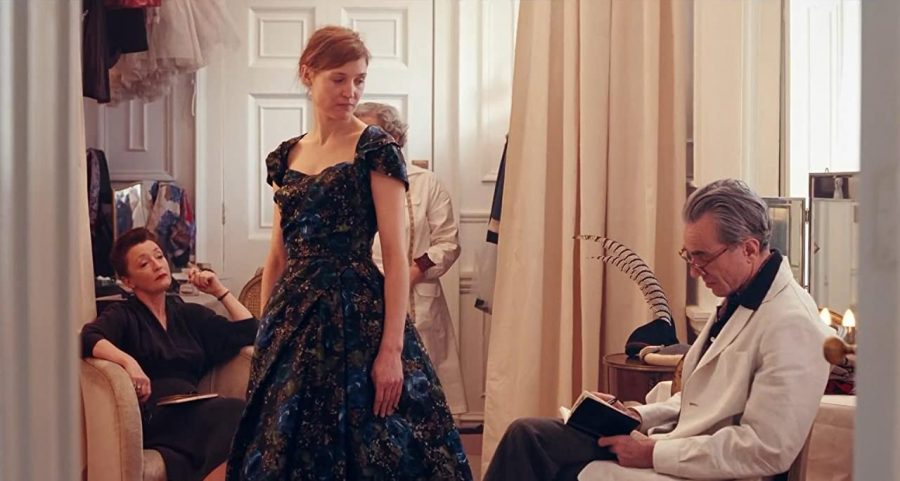Hidden Gem: ‘Phantom Thread’ (2017)
Daniel Day-Lewis, Vicky Krieps, and Lesley Manville appear in the movie “Phantom Thread”. This movie was released on Jan. 19, 2018.
Jun 29, 2021
For the past two and half decades, Paul Thomas Anderson has been one of America’s most creative writers/directors. His eight feature films, starting with his tough tale of professional gamblers “Hard Eight” (1996) through the Oscar-nominated “Magnolia” (1999), “There Will be Blood” (2007) and “The Master” (2012) each feature refreshing original plots with variations on traditional narratives and richly defined characters by some of Hollywood’s finest actors.
For some reason, though, Anderson’s most recent film, “Phantom Thread” (2017), his fictional tale of 1950s British designer/dressmaker Reynolds Woodcock, failed to find its American audience. This is despite receiving six Oscar nominations, including those of best picture, director and actor (Daniel Day-Lewis) and winning the award for best costume design.
Like many great filmmakers who were students of films past, “Phantom Thread” clearly echoes themes in Orson Welles’ “Citizen Kane” and Alfred Hitchcock’s “Rebecca” and “Vertigo.” This fascinating tale not only explores the world of a 1950s fashion designer but in addition, this creative artist’s romantic obsession with a young woman who becomes his muse.
Using the interview format common to many films, especially “Citizen Kane,” Anderson begins the film with a young woman appreciatively saying, “Reynolds made my dreams come true. And I have given him what he desires most in return … maybe he’s the most demanding man.”
Flashbacks show how Reynolds Woodcock first meets this young woman, Alma Elson (Vicky Krieps), when he decides to stop for breakfast at a quaint seaside diner. She’s a rather simple but attractive waitress who immediately captures his attention. After inviting her to dinner later that day, he takes her to his workshop and instantly begins designing an elegant dress for her. And, like Charles Forster Kane’s passion for his second wife Susan, the would-be opera singer, Reynolds’ obsession with Alma begins.
Get The Daily Illini in your inbox!
Day-Lewis is simply outstanding. He immerses himself in the role of designer Woodcock, much like his three previous Oscar-winning best actor performances in “My Left Foot,” “Lincoln” and “There Will be Blood.” He’s an intense, self-declared bachelor who is married to his work. Working closely with his executive assistant, his sister Cyril (Lesley Manville), his House of Woodcock designs fashions for socialites, debutants and even royalty.
He claims the deepest respect for his late mother who taught him his trade. His demanding creativity inspires him to work through most meals, work late into the evening or any time of the day for that matter. His passive-aggressive manner motivates those around him to inspire their best work. And his love for Alma is an odd blend of intense passion and yet seemingly harsh demands. He hates especially when Alma interrupts his routines or offers surprises to his daily activities.
Eventually, Alma becomes extremely frustrated, complaining that Reynolds is too distant and just concerned about all his precise rules, and his business. Things seem to take a dark turn when Alma appears to experiment with cooking with poison mushrooms and Reynolds becomes gravely ill with fever and vomiting. When he recovers, he becomes apologetic and confesses his love to Alma and proposes they finally marry.
In two intriguing scenes, Anderson creates much empathy for Reynolds by eliminating dialogue, using only background music and noises to express the characters’ movements. In one particular lengthy scene, Alma prepares a mushroom omelet for her husband and suspensefully watches him eat it, making us wonder if she’ll make him ill again.
Anderson’s cinematography and delicate lighting sumptuously capture the glamorous world of a haute couture dressmaker. His ensemble cast of featured actors nicely complements and contrasts Reynolds’ passions, especially Krieps’ strong-willed Alma and Lesley Manville’s officious Cyril, who received a much-deserved Oscar nomination for best supporting actress.
Anderson’s outstanding film received much critical praise in its initial release, but months before “Phantom Thread” was released, Day-Lewis announced his retirement from acting, claiming a personal lack of value in his work.
“If an audience believes it, that should be good enough for me,” he said. “But lately, it isn’t.”
His swan song is an outstanding farewell.






